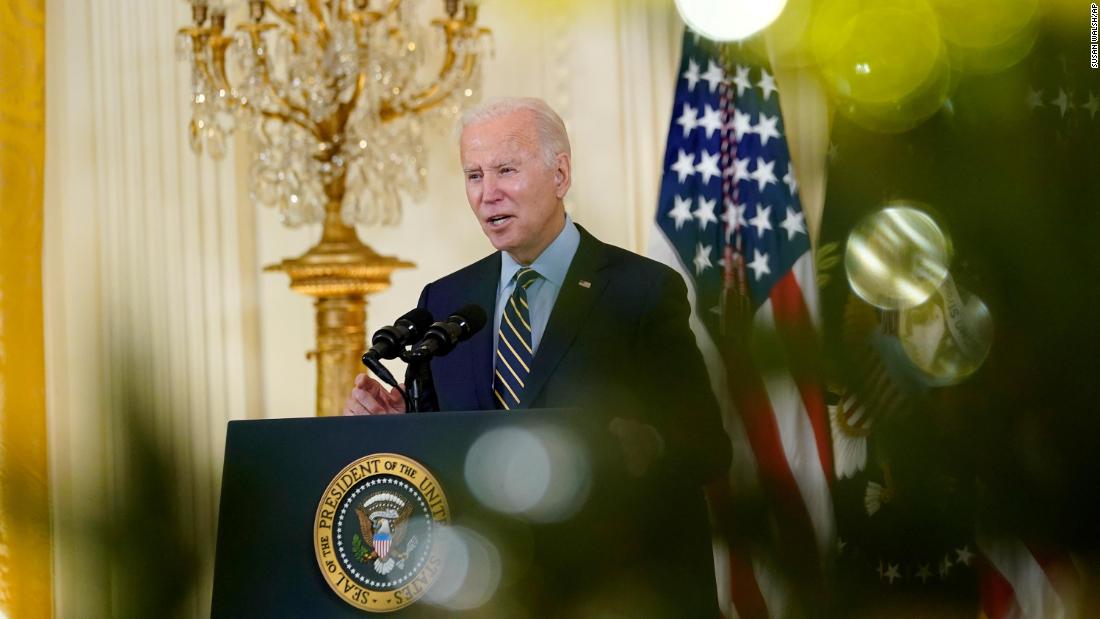Biden says ‘democracy needs champions’ as Jan. 6 probe intensifies
“In the face of sustained and alarming challenges to democracy, universal human rights, and all around the world, democracy needs champions,” Biden said as he kicked off the summit.
The President continued: “I wanted to host this summit because … here in the United States we know as well as anyone that renewing our democracy and strengthening our democratic institutions requires constant effort.”
“American democracy is an ongoing struggle to live up to our highest ideals and to heal our divisions and recommit ourselves to the founding idea of our nation captured in our Declaration of Independence, not unlike many of your documents,” Biden said, calling it the “defining challenge of our time.”
Biden announced the establishment of the Presidential Initiative for Democratic Renewal, which will build on the US’ ongoing work to bolster democracy and defend human rights around the world.
The United States is planning to provide up to $424.4 million toward the initiative, which will focus on supporting free and independent media, fighting corruption, bolstering democratic reformers, advancing technology for democracy and defending free and fair elections and political processes, the White House said in a fact sheet. These funds will be subject to congressional appropriations.
The President quoted the late civil rights leader Rep. John Lewis of Georgia as he opened the summit, calling him a “great champion of American democracy and for civil rights around the world.”
“With his final words, as he was dying, to our nation last year he reminded our country: ‘Democracy is not a state, it’s an act,'” Biden said.
The President said though democracy can be fragile, he believed it is “inherently resilient” and capable of “self correction” and “self improvement.”
Biden called on the global community to “stand up for the values that unite us,” including free speech, free assembly, free press, freedom of religion and human rights.
White House principal deputy press secretary Karine Jean-Pierre told reporters on Wednesday that the focus of the summit will be “on what the President has called ‘the challenge of our time’ — reversing the ongoing global democratic recession and ensuring that democracies deliver for their people.”
The summit comes after a week of Biden confronting two emerging global, authoritarian superpowers — Russia and China — over their actions.
The President is separately expected to speak with Ukrainian President Volodymyr Zelensky “to discuss Russia’s military buildup on Ukraine’s borders” and the Bucharest Nine group “to brief them on his call with President Putin, hear their perspectives on the current security situation and underscore the United States’ commitment to trans-Atlantic security.”
Ahead of the summit, the White House highlighted provisions in Biden’s social safety net bill, which has yet to be passed by the Senate. The administration says many of the provisions will “make critical investments in American democracy,” such as expanding access to broadband, establishing a Civilian Climate Corps, investing in civic infrastructure and providing tax credits for local newsrooms.
The White House also says the administration “is taking bold action across the summit’s three broad themes: strengthening democracy and defending against authoritarianism; fighting corruption; and promoting respect for human rights.”
A White House statement ahead of the summit also promoted the administration’s “decisive action to restore and strengthen American democracy, from cracking down on corruption and promoting transparency to taking critical steps to ensure the federal government works for every American — no matter what they look like or where they live.”
“This cause will be a guiding principle throughout the President’s time in office, and that includes prioritizing the fight to pass the Freedom to Vote Act and the John Lewis Voting Rights Advancement Act to protect the sacred right to vote in free, fair, and secure elections,” the statement said.
When asked on Wednesday whether the President would use the summit to address what he’s doing to uphold democracy in the US — including in regard to the January 6 insurrection and the struggle to get voting rights legislation passed — Jean-Pierre said, “I don’t want to get ahead of what the President is going to say tomorrow. But … all the things that you just mentioned … are clearly things that the President feels are key and important things that we need to address here in our country.”
Along with existing actions, the White House has put forward new initiatives aimed at the summit’s goals.
On Wednesday the White House announced that an interagency Information Integrity Research and Development Working Group will develop a strategic plan “to better understand the full information ecosystem.”
The new “liability fund” will support “reporters and news organizations that are targeted with litigation as a result of their reporting,” said Blinken.
Following the summit, the Biden administration “will convene governmental, civil society and private-sector partners during a year of consultation, coordination and action to advance democracy,” the White House said.
The White House says Biden intends to gather world leaders again in a year “to showcase our collective progress and forge a path forward.”
This story has been updated with Thursday’s developments.
CNN’s Michael Conte contributed to this report.
![]()


